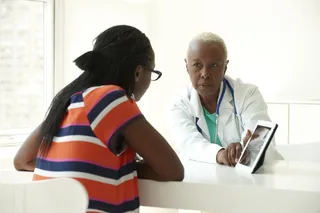HPV 101: What You Need to Know
Facts about the most common STD in the U.S.

1 / 10
What You Need to Know About HPV - January is Cervical Health Awareness Month. Genital human papillomavirus (HPV) is an STD that threatens Black women’s cervical health. How much do you know about the most common STD in the U.S.? – Kellee Terrell (Photo: Getty Images/STOCK)
Photo By Getty Images/STOCK

2 / 10
What Is HPV? - There are more than 40 HPV types that can infect the genital areas of men and women. These HPV types can also infect the mouth and throat. Most people who become infected with HPV don’t even know they have it. (Photo: Getty Images/STOCK)

3 / 10
How Many People Have HPV? - It’s estimated that over 20 million people have HPV and that 50 percent of all sexually active people will contract it in their lifetime. Black women and girls are 1.5 times more likely to test positive for HPV. (Photo: Getty Images/STOCK)

4 / 10
HPV's Most Common Symptoms - Most times, there are no symptoms at all. But for those who show signs of HPV, they may develop genital warts, oral cancer, penile cancer, anal cancer or cervical cancer. The strain of HPV that causes genital warts is not the same strain that causes some cervical cancers in women. (Photo: Getty Images/STOCK)
Photo By i love images/Getty Images

5 / 10
Black Women Have a Harder Time Clearing Up HPV - In 90 percent of people with HPV, the STD will clear itself up on its own in a matter of two years. But in Black women, it’s more complicated. A 2012 study found that it took almost six months longer for African-American patients to be clear of HPV. (Photo: The Press-Register /Landov)
ADVERTISEMENT

6 / 10
Cervical Cancer and You - Some doctors believe that because HPV stays in our systems longer, this may have something to do with our cervical cancer rates — and they are not encouraging. African-American women are 40 percent more likely to develop cervical cancer caused by the STD human papillomavirus (HPV) and 20 percent more likely to die from it compared to white women. (Photo: Getty Images/STOCK)

7 / 10
Do Condoms Prevent HPV? - Not always. Condoms can lower your risk of contracting HPV. But you can still contract HPV when using condoms because HPV can infect the areas that are not covered by a condom. (Photo: Getty Images/STOCK)

8 / 10
What About the Vaccine? - There are two forms of the vaccine (Cervarix and Gardasil) available for girls and young women ages 11-26. Boys and young men can receive Gardasil, too. These vaccines can be expensive — the set of three shots required can cost up to $390 and not all insurances cover it. And Black girls are 35 percent less likely to get the vaccine. (Photo: Joe Raedle/Getty Images)

9 / 10
Oral Sex and HPV - Some teens think this form of sex is the most safe, but recent studies have shown that oral cancer rates have tripled over the past 20 years. In 1988, eight out of 1 million Americans were diagnosed with an HPV-related oral cancer. Today, it's 26 out of 1 million. (Photo: Getty Images/STOCK)
